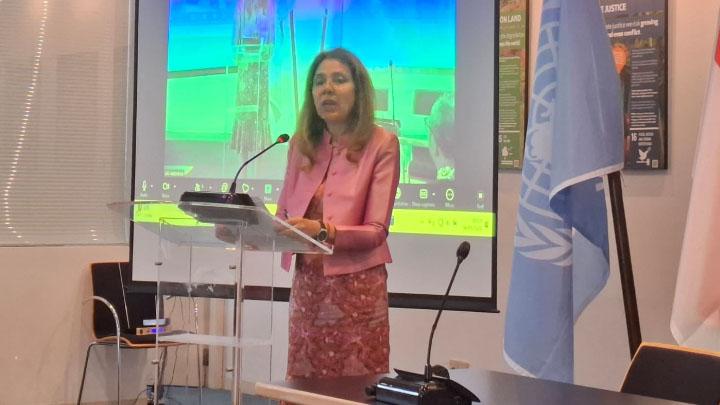November 27, 2024 | 08:33 pm

NATIONAL INFO - The Subdistrict Dashboard is an initiative by Indonesia's Ministry of Home Affairs aimed at enhancing the synergy between village and regional development planning. Through training and the application of technology, this program seeks to accelerate development processes and improve public service delivery at the subdistrict level.
The Subdistrict Dashboard has emerged as a critical initiative currently implemented by the Directorate General of Regional Administration (Adwil) at the Ministry of Home Affairs. Its primary objective is to foster greater synergy in development planning between villages and regions by leveraging technology to streamline development processes and enhance the efficiency of public services.
Edi Cahyono, Acting Director of Deconcentration, Co-Administration Tasks, and Cooperation at the Directorate General of Regional Administration, emphasized the dashboard's pivotal role in strengthening the connection between central and local governments. "The Subdistrict Dashboard is designed to achieve synergy in village-regional development planning through the Frontline Service Delivery supervision strategy while operating as a working tool at the subdistrict level," he explained in an interview with The Editor, November 22th, 2024.
The dashboard is part of the Strengthening Village Governance and Development Program (P3PD) spearheaded by the Ministry of Home Affairs. This program offers training to subdistrict heads and village officials, enabling them to enhance their capacity for data-driven, integrated development planning. The training also aims to reinforce coordination between central and regional governments to ensure effective and measurable development outcomes.
Edi further elaborated that the training includes establishing teams to manage the Subdistrict Dashboard in collaboration with the P3PD Secretariat. These teams play a crucial role in creating shared agendas for monitoring and evaluating training outcomes through a dedicated website. This mechanism ensures more effective tracking of development processes at the village and subdistrict levels. The training also focuses on equipping subdistrict heads with administrative expertise and the ability to act as intermediaries between village and district governments.
The training covers key aspects related to basic services at the subdistrict level. This includes facilitating the consolidation of area-based basic service data and improving village planning in education, health, public works, and social sectors. Participants are also introduced to enhanced models of coordination for basic service delivery at the subdistrict level, empowering them to manage community feedback and complaints more effectively.
Furthermore, the Directorate General of Regional Administration is committed to ensuring that this training supports regional governments, particularly at the subdistrict level, in monitoring the use of village budgets and expenditures. This initiative is part of broader efforts to increase transparency and accountability in village-level development implementation.
Five ministries actively contribute to this program: the Ministry of Villages, Development of Disadvantaged Regions, and Transmigration (Kemendes-PDTT), the Ministry of Home Affairs (Kemendagri), the Coordinating Ministry for Human Development and Culture (Kemenko PMK), the Ministry of Finance (Kemenkeu), and the National Development Planning Agency (Bappenas). Each ministry plays a complementary role to ensure the program's success. For instance, Kemendagri provides capacity-building training for village officials, while Kemendes-PDTT focuses on empowering communities through village facilitators.
As part of this initiative, innovative models such as village field schools, digital villages, and digital ambassadors are being introduced. These initiatives aim to equip village communities with the skills to adapt to evolving technological and informational advancements.(*)
Click here to get the latest news updates from Tempo on Google News
P3PD Promotes Independent Villages Through Training for Subdistrict Heads and Village Officials
41 menit lalu

Strengthening the roles of subdistrict heads and village officials to support inclusive, transparent, and sustainable village development.
Bappenas Emphasizes More Adaptive Rural Governance
5 hari lalu

Bappenas highlights the importance of adaptive governance to enhance independence and sustainable development in rural areas.
TP PKK Chairperson Calls for Optimal and Efficient Use of Program Budgets
6 hari lalu

PKK programs are vital in supporting national development efforts.
TP PKK Chairperson Highlights the Importance of Information Technology in Program Implementation
6 hari lalu

The PKK remains committed to its priority programs, including addressing stunting, enhancing family quality, character building, and education.
Tito Karnavian Urges TP PKK to Achieve Asta Cita Goals
6 hari lalu

Tito Karnavian emphasizes the critical role of TP PKK & Posyandu in advancing the Asta Cita program, focusing on food security and energy efficiency.
Bappenas Chief: Indonesia's Economy Has Stagnated for 20 Years
7 hari lalu

Indonesia's economy has stagnated over the past two decades, says Bappenas head.
6 Villages You Can Visit in Indonesia, Stunningly Underrated
9 hari lalu

Relieve your stress by visiting these stunning villages in Indonesia. From magical lake to surreal waterfall, your days will be filled with only peace
La Ode Ahmad P Bolombo Encourages Collaboration for Village Advancement
12 hari lalu

La Ode Ahmad P. Bolombo promotes cross-sector partnerships to accelerate village development.
Yandri Susanto PDT Commits to Maximizing Village Potential Nationwide
12 hari lalu

Yandri Susanto prioritizes empowering villages to drive Indonesia's growth through sustainable local initiatives.
Yandri Susanto Urges Villages to Achieve Food Sovereignty by 2030
13 hari lalu

Yandri Susanto encourages villages to harness their agricultural potential for national food self-sufficiency by 2030.

 3 months ago
72
3 months ago
72












































